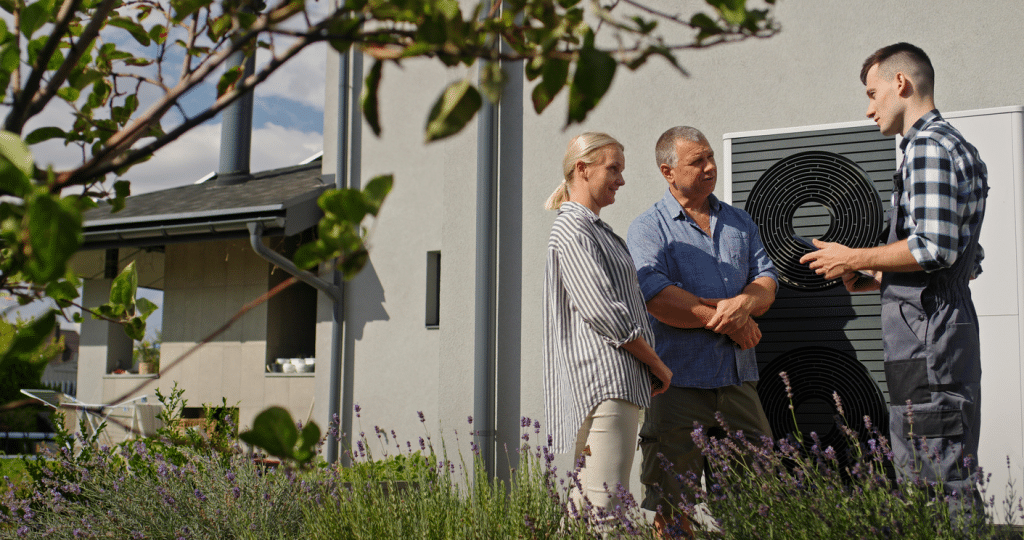
When it comes to your home’s comfort and long-term expenses, choosing the right heating system is one of the most important decisions you’ll make. The best choice for your space depends on your local climate, your budget, and how energy-efficient you want to be. A heat pump is a great option because it efficiently handles both heating and cooling by transferring heat. In contrast, traditional systems like gas or oil furnaces generate heat by burning fuel. Whether you’re building a new place, replacing an old furnace, or exploring your options, understanding how each system works is the first step toward a more comfortable and efficient home. Take some time to explore these heating choices to help you figure out which system is best for your home.
What is a Heat Pump?
Heat pumps offer an energy-efficient way to heat and cool your home all year. In the winter, they absorb heat from the air, water, or ground outside and circulate refrigerant to warm the indoors. In the summer, they reverse this process to cool the house, working like an air conditioner transferring heat from inside to the outside. Unlike furnaces, which burn fuel to produce heat, heat pumps move heat from the surrounding environment. They are more environmentally friendly and cost-effective, making them a practical choice for year-round comfort.
Understanding Heat Pump Technology
A heat pump is a system for heating and cooling that works based on thermodynamic principles, specifically the vapour-compression refrigeration cycle. Unlike traditional heating methods such as gas or electric furnaces, which create heat through combustion or electric resistance, a heat pump uses electricity to move heat from one place to another. This approach is what makes heat pumps very energy efficient.
At the core of a heat pump system are four key components: a compressor, a reversing valve, two heat exchanger coils (one for indoors and one for outdoors), and an expansion valve. The system circulates a refrigerant, which is a fluid that boils at a very low temperature. Heat pump technology can be divided into two main modes:
Heating Mode: Efficient Heat Energy Transfer
In heating mode, air source and cold climate heat pumps extract heat from the outside air, even in extremely cold conditions. The refrigerant transforms into a low-pressure gas and is compressed, which raises its temperature. This process allows warm air to circulate through the indoor coil and ductwork. Ground source heat pumps, also known as geothermal heat pumps, operate similarly. They draw from the relatively stable temperature of the ground, improving their efficiency and providing consistent heating throughout the year.
Cooling Mode: Dual-Function Comfort
In cooling mode, the heat pump functions like an air conditioner by reversing the refrigerant flow with a reversing valve. The indoor coil absorbs heat from the indoor air while the outdoor unit releases it outside. This dual functionality enables the heat pump to manage both heating and cooling without the need for a separate air conditioning system. This setup helps reduce energy costs and supports energy efficiency. Additionally, variable-speed heat pumps can further improve efficiency and comfort by adjusting their output to match real-time cooling needs.
Heat Pump Benefits
- Energy Efficiency
When it comes to energy efficiency, heat pumps stand out compared to traditional heating systems that use combustion or electric resistance.
- Coefficient of Performance (COP): Many modern heat pumps have a COP between 2 and 5. This means they can produce two to five times more heat than the electricity they consume. For example, just 1 kilowatt-hour (kWh) of electricity can provide you with 2 to 5 kWh of heating energy.
- Lower Operational Costs: Due to their high efficiency, you may notice a decrease in your energy bills, especially in milder climates.
- Versatility
Heat pumps are a two-in-one solution that provides both heating and cooling.
- All-in-One Solution: By reversing the refrigerant flow, heat pumps can function like air conditioners in the summer. This means you won’t need separate systems for heating and cooling. It simplifies maintenance and reduces installation costs.
- Environmental Benefits
Using heat pumps can help lower greenhouse gas emissions, making your home more eco-friendly.
- Reduced Carbon Footprint: Since heat pumps primarily rely on electricity rather than fossil fuels, they generate fewer carbon emissions. Additionally, as more homeowners adopt renewable energy sources such as solar, the environmental benefits improve.
- Sustainability Incentives: Many government programs offer incentives for installing energy-efficient systems, such as heat pumps, which encourage greener heating options.
- Improved Indoor Air Quality
Heat pumps significantly enhance indoor air quality by continuously circulating and filtering the air.
- Air Filtration: With filters that capture dust, allergens, and pollutants, heat pumps significantly enhance air quality. They are a good option for anyone with allergies.
- Humidity Control: They also help maintain indoor humidity levels. This not only improves comfort but also prevents problems like mould growth.
- Temperature Consistency
Heat pumps effectively maintain steady temperatures throughout your home.
- Even Heating: They distribute warm air evenly, so you won’t experience cold spots, ensuring every room stays comfortable.
- Variable Speed Technology: Many models feature variable speed compressors that adjust their output based on heating needs. This keeps indoor temperatures stable.
- Long Lifespan and Low Maintenance Requirements
Heat pumps generally last longer than traditional heating systems.
- Longevity: With proper care, they can last between 15 and 25 years, which is longer than many conventional systems.
- Lower Maintenance Costs: These systems often require fewer repairs and less frequent servicing. Most maintenance consists of simple tasks, like cleaning filters and checking refrigerant levels.
Traditional Heating Systems: Gas, Oil, and Electric
Gas Furnaces
Gas furnaces deliver a substantial amount of heat and can warm your home, regardless of how low the outdoor temperature drops. They ignite natural gas in a combustion chamber, creating hot gases. These gases flow through a heat exchanger, which heats the circulating air without mixing it with exhaust gases, keeping the indoor air safe. A blower fan then distributes the warm air throughout your home and sends any combustion byproducts outside through an exhaust vent.
- High Output: Can produce a lot of heat during very cold months.
- Energy Efficiency: Most new gas furnaces have an Annual Fuel Utilization Efficiency (AFUE) rating of 90% or higher, resulting in lower energy bills.
- Quick Heating: Provides immediate warmth, responding rapidly to the thermostat’s signal for heat.
- Availability: Natural gas is often accessible through an existing grid, making installation convenient.
Gas furnaces are a good choice for homeowners who want steady and reliable heat.
Oil Furnaces
Oil furnaces function similarly to gas furnaces, but they use heating oil as their fuel. They often outperform gas furnaces in colder climates, providing more heat per unit than natural gas. However, heating oil prices can be unpredictable, which can impact operational costs over time. Oil furnaces draw heating oil from an external tank and turn it into fine droplets before igniting it in the combustion chamber. The hot exhaust gases are moved through a heat exchanger, warming the air circulated throughout the house by a blower fan. Like gas furnaces, oil furnaces vent combustion gases outside to maintain indoor air quality.
- Strong Performance in Cold Climates: Designed to handle low temperatures, keeping indoor spaces cozy and efficient.
- Higher Heat Output: Generally produces more heat per gallon than natural gas, making it ideal for larger homes.
- Durability: With proper maintenance, oil furnaces often last longer, providing a solid return on your investment.
- Backup Option: They can be a dependable choice if natural gas isn’t available.
While oil furnaces are effective for heating, homeowners should be aware of fluctuating fuel prices when considering this option.
Electric Furnaces
Electric furnaces use electric resistance heating elements that create warmth when electricity flows through them. A blower fan pulls in cool air and pushes it over these heated elements, warming the air before it’s distributed throughout the home. The thermostat controls the operation, turning the electric furnace on and off based on the desired temperature, while safety features prevent overheating. While they may not be as energy-efficient as heat pumps, they provide reliable heating and can serve as a great supplemental or backup option for homes that depend on heat pumps.
- Ease of Installation: They are generally simpler and more affordable to install than gas or oil systems since they don’t require fuel lines or storage tanks.
- Lower Initial Costs: The purchase and installation costs are often lower compared to gas or oil furnaces.
- Safety: They eliminate the risks associated with gas leaks or oil spills, making them a safer heating option.
- Consistent Heating: Electric furnaces provide steady warmth, maintaining stable temperatures without the fluctuations that can occur with combustion systems.
Overall, electric furnaces are a reliable heating option, especially when used in conjunction with a heat pump on extremely cold days.
Heat Pump vs. Traditional Heating: A Quick Comparison
When comparing heat pumps and traditional heating systems, it’s essential to understand their differences in operation, efficiency, and environmental impact. This comparison will help you assess the efficiency, cost, and environmental impact of each option, making it easier to choose the one that best suits your comfort and budget.
Heat Pumps
- Functionality: A heat pump is a versatile system that can both heat and cool your home by transferring heat. This means you won’t need a separate air conditioning unit.
- Energy Efficiency: Heat pumps are highly energy-efficient because they transfer existing heat rather than generating it from scratch. Their efficiency is measured by the Heating Seasonal Performance Factor (HSPF), with modern models achieving an impressive efficiency range of 200-400%.
- Climate Suitability: Standard heat pumps are most effective in moderate climates, but specialized cold climate heat pumps and ground-source heat pumps are also suitable for use in extremely cold temperatures.
- Environmental Impact: Since heat pumps run entirely on electricity, they produce no on-site greenhouse gas emissions, which can significantly reduce your home’s carbon footprint.
- Cost: While the initial installation cost of a heat pump can be higher, the lower operating costs often lead to savings over time.
Traditional Heating Systems (Gas, Oil, Electric)
- Functionality: Gas or oil furnaces are designed only for heating, which means you will need a separate air conditioning system for cooling.
- Energy Efficiency: These furnaces generate heat by burning natural gas or heating oil, which is usually less efficient than the heat transfer process utilized by heat pumps. Their efficiency is measured by Annual Fuel Utilization Efficiency (AFUE), with top models reaching up to 98% efficiency.
- Climate Suitability: Traditional heating systems perform well in cold climates, providing consistent, high-output warm air even when temperatures drop significantly.
- Environmental Impact: Systems that rely on combustion release greenhouse gases and other pollutants, which can contribute to an increased carbon footprint.
- Cost: The initial costs for a gas furnace, oil furnace, or electric furnace are typically lower than for a heat pump. However, depending on the market prices for natural gas, heating oil, or electricity in your area, the ongoing operating costs may be higher over time.
Evaluating Your Heating Options
Choosing between heat pumps and traditional heating systems depends on effectiveness, energy efficiency, and suitability for your climate. Heat pumps offer both heating and cooling with lower operating costs and a reduced environmental impact. In contrast, gas and oil furnaces work well in extreme cold by providing immediate heat. Assessing your needs and local climate will help you find a heating solution that aligns with your energy efficiency goals and comfort requirements.
Ready to Upgrade Your Heating? Trust Horizon Heating for Your HVAC Needs.
For expert help and professional installation, you can rely on Horizon Heating. From dependable heat pump installations to reliable furnace installations and repairs, we ensure your home is equipped with the most efficient system for comfort throughout the year. Contact us today to get started!

